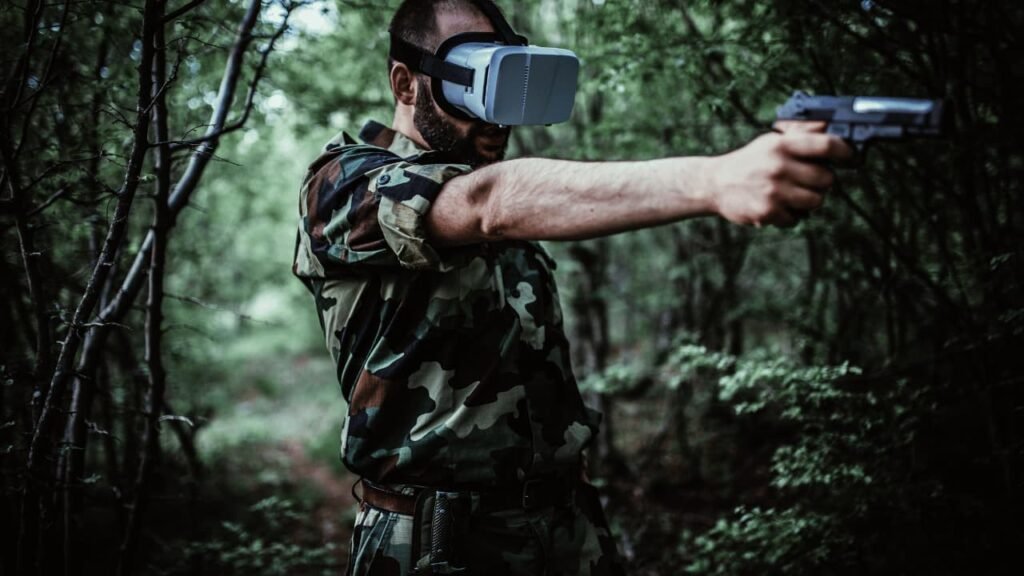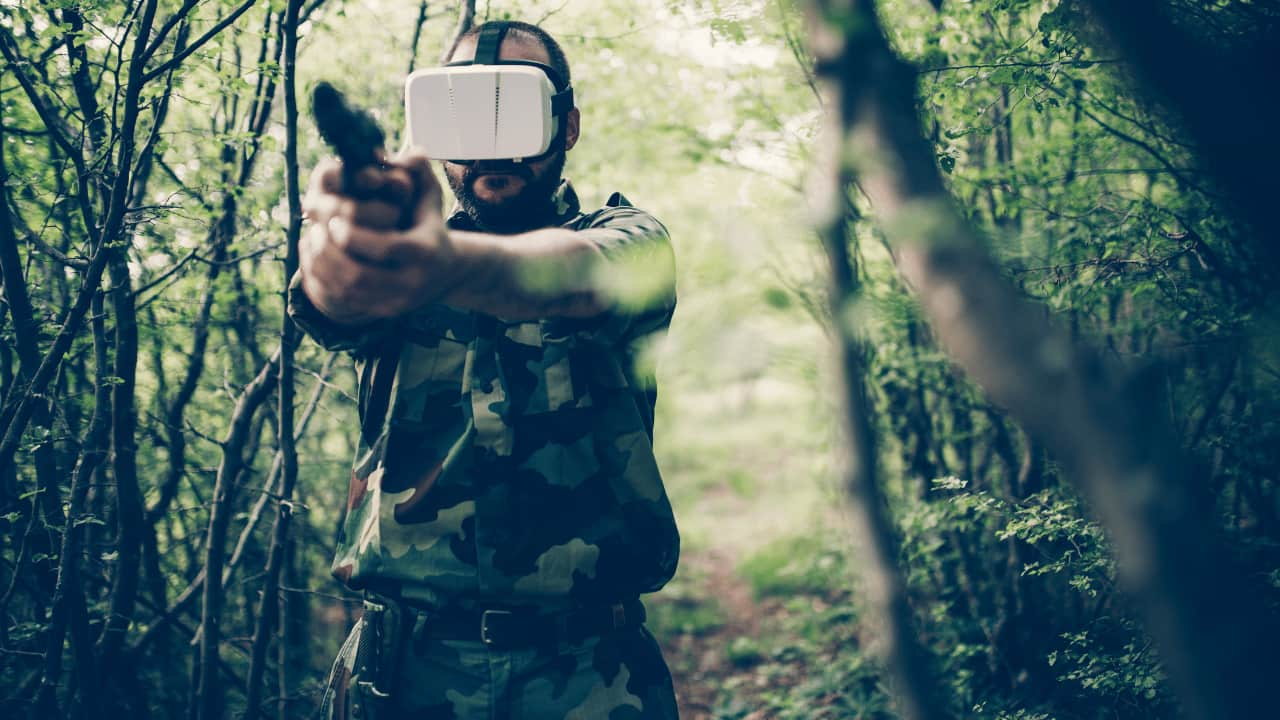Virtual reality (VR) technology has the potential to revolutionize various industries, and one area where its impact is becoming increasingly evident is police training.
Virtual reality police training offers a realistic and immersive environment that can enhance the skills, decision-making abilities, and response capabilities of law enforcement officers.
This blog delves into the transformative power of virtual reality in police training, exploring its benefits, applications, and the future of this innovative technology.
Understanding Virtual Reality in Police Training
This section provides a comprehensive overview of virtual reality technology and its relevance to police training. It explains the core concepts and components of VR, including headsets, motion tracking, and haptic feedback, highlighting how these elements come together to create an immersive training experience for law enforcement personnel.
5 Benefits of Virtual Reality in Police Training

This section outlines the various advantages of incorporating virtual reality into police training programs. Some key benefits include:
1. Realistic Scenario Training:
VR allows officers to experience realistic and high-pressure scenarios, such as active shooter situations, hostage crises, and de-escalation encounters. This immersive training helps improve decision-making, critical thinking, and situational awareness while minimizing potential risks.
2. Use-of-Force Training and De-escalation Techniques:
Virtual reality can simulate use-of-force situations, enabling officers to practice appropriate response strategies, de-escalation techniques, and crisis intervention skills. This training promotes effective and proportionate use of force, reducing the likelihood of excessive or inappropriate actions in real-life encounters.
3. Cultural Competence and Bias Training:
VR simulations can provide officers with exposure to diverse communities and scenarios, facilitating cultural competence and sensitivity training. By experiencing different perspectives and cultural contexts, officers can enhance their understanding, empathy, and communication skills, leading to improved community relations.
4. Stress Inoculation and Resilience Building:
Virtual reality offers a controlled environment to expose officers to high-stress situations, helping them develop resilience, emotional control, and adaptive responses. By repeatedly practising in virtual scenarios, officers can improve their ability to manage stress, make sound decisions under pressure, and maintain their well-being in the field.
5. Forensics and Crime Scene Investigation:
Virtual reality can be used to recreate crime scenes and facilitate virtual walkthroughs for forensic training purposes. This technology allows officers to practice evidence collection, documentation, and analysis, enhancing their investigative skills and accuracy.
6. Enhanced Empathy and Perspective-Taking:
Virtual reality can foster empathy and perspective-taking skills among law enforcement officers. By immersing officers in virtual scenarios that depict different perspectives, such as encounters with individuals from diverse backgrounds, and communities, or experiencing mental health crises, VR training can help officers develop a better understanding of others’ experiences and challenges.
This enhanced empathy can contribute to improved communication, de-escalation techniques, and community relations, ultimately leading to more effective and empathetic policing.
7. Error Management and Learning from Mistakes:
Virtual reality provides a safe space for officers to make mistakes, learn from them, and refine their skills without real-world consequences. By engaging in VR simulations, officers can experiment with different approaches, tactics, and decision-making strategies.
If an officer makes an error during a VR training scenario, they can receive immediate feedback and learn from their mistakes, allowing for continuous improvement and the development of best practices.
8. Officer Well-being and Mental Health Training:
Virtual reality can be utilized to address the psychological well-being and mental health of law enforcement officers.
Training programs can incorporate VR experiences that simulate stressful and emotionally challenging scenarios officers may encounter in the field, such as handling traumatic incidents or dealing with confrontational individuals.
By providing officers with a controlled and immersive environment to navigate these scenarios, VR training can help build resilience, and emotional coping mechanisms, and promote mental health awareness and support within the police force.
You May Also Like:
15+ Benefits of Virtual Reality in the Healthcare Industry
Augmented Reality in Healthcare
5 Applications of Virtual Reality in Police Training
1. Use-of-Force Training:
Virtual reality provides a realistic and immersive platform for officers to train in use-of-force scenarios.
Officers can practice decision-making, de-escalation techniques, and appropriate response strategies in simulated high-stress situations, allowing them to refine their skills and judgment while minimizing risks associated with real-life training exercises.
2. Tactical Training and Firearms Simulation:
Virtual reality enables officers to train in tactical skills and firearms handling in a safe and controlled environment.
Officers can practice scenarios such as room clearing, hostage situations, and active shooter responses, improving their tactical decision-making, marksmanship, and coordination with fellow officers.
3. Crisis Intervention and De-escalation Training:
Virtual reality simulations can replicate encounters involving individuals in crisis or with mental health issues.
This training allows officers to practice effective communication, active listening, empathy, and de-escalation techniques, preparing them to respond appropriately and safely in real-life scenarios where de-escalation is crucial.
4. Emergency Response and Disaster Preparedness:
Virtual reality can simulate various emergency response situations, including natural disasters, terrorist attacks, or mass casualty incidents.
Officers can train in coordination, incident management, and decision-making in high-pressure and time-sensitive situations, improving their preparedness and ability to handle complex emergencies.
5. Investigative Training and Crime Scene Reconstruction:
Virtual reality technology can aid in investigative training by recreating crime scenes and facilitating virtual walkthroughs. Officers can practice evidence collection, analysis, and documentation in a realistic and interactive virtual environment, enhancing their investigative skills, accuracy, and efficiency.
These applications of virtual reality in police training contribute to improved officer readiness, enhanced decision-making abilities, and better community policing practices.
By providing immersive and realistic training experiences, virtual reality helps law enforcement agencies develop highly skilled and well-prepared officers who can effectively navigate challenging and dynamic situations in the field.
Challenges and Future of Virtual Reality Police Training
This section discusses the challenges and considerations associated with implementing virtual reality in police training. Some key challenges include cost, hardware limitations, content development, and the need for ongoing updates and improvements.
Additionally, the future prospects of virtual reality in police training are explored, including advancements in technology, increased accessibility, and the integration of other emerging technologies like artificial intelligence for more realistic and interactive simulations.
FAQ’s
What is meant by VR in police department?
VR in the police department refers to the use of virtual reality technology as a training and simulation tool for law enforcement personnel.
Virtual reality (VR) creates a simulated environment that can replicate real-world scenarios and immerse users in a digital environment using specialized headsets, motion-tracking devices, and haptic feedback.
In the context of the police department, VR is used to enhance various aspects of training for law enforcement officers. It provides a safe and controlled environment where officers can practice critical skills, decision-making, and response techniques in realistic scenarios.
VR simulations can include use-of-force training, tactical exercises, crisis intervention scenarios, emergency response simulations, and investigative training.
By utilizing VR technology, law enforcement agencies aim to provide officers with immersive and hands-on training experiences that closely mimic real-life situations.
This allows officers to develop and refine their skills, improve their decision-making capabilities, enhance situational awareness, and practice appropriate response strategies.
VR training in the police department offers several advantages, including risk mitigation during training, cost-effectiveness compared to traditional training methods, the ability to simulate complex and high-stress situations, and the opportunity for repeated practice and performance evaluation.
It also allows for the standardization of training protocols, the collection of training data and analytics, and the opportunity for remote training and collaboration.
Overall, VR in the police department serves as a valuable tool to enhance officer training, improve preparedness, and foster the development of essential skills required for effective and responsible law enforcement.
Conclusion
Virtual reality is revolutionizing police training by offering a safe, immersive, and realistic training environment that enhances officer skills, decision-making abilities, and response capabilities.
By leveraging virtual reality technology, law enforcement agencies can bridge the gap between theoretical training and real-life scenarios, ensuring that officers are better prepared to handle complex situations and serve their communities effectively.
As technology continues to evolve, it is essential for law enforcement agencies to embrace virtual reality as a powerful tool in training the next generation of police officers.
You May Also Like:
Benefits Of VR Military Training

